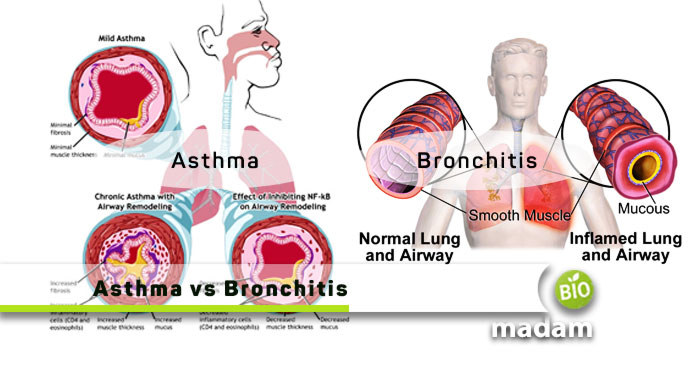You might have seen people with breathing problems despite that they are actively involved in different breathing exercises. People usually think they are experiencing issues like asthma or COPD, however, it is possible that they have had bronchitis instead. The presentation of asthma and bronchitis is quite alike, yet they are not one disease and are treated differently. To understand the management of bronchitis and asthma, you must know the presenting condition first.
One of the major differences between asthma and bronchitis is the causing factor. While asthma is related to dust, pollen, or genetic changes, bronchitis is caused by pollution, smoking, bacteria, or viruses. Let’s explain them to you in detail, so there is no ambiguity about their diagnosis and management.
Comparison Table
| Factor | Asthma | Bronchitis |
| Causes | Dust, pollen, pollution, and family history | Pollution, active or passive smoking, industrial fumes, and tobacco |
| Symptoms | Coughing, shortness of breath, wheezing, tightening of muscles | Wheezing, mild temperature, mucus production, etc. |
| Severity | Chronic | Could be acute or chronic |
| Affected Cells | Inflammation-causing cells | Inflammation fighting cells |
| Management | Corticosteroidal inhalers and anti-histamines | Bronchodilators |
What is Asthma?
Asthma is a breathing disorder that arises from environmental factors like pollen or dust and presents as swelling and tightening of muscles around the airway. This swelling and tightening of the muscles cause the airway to narrow, and you find it difficult to breathe.
What Causes Asthma?
Asthma is caused by multiple factors, including the history of asthma in the family. Some of these causes are the same for bronchitis, like smoking and pollution. It could be caused or triggered by:
- Pollution
- Dust
- Pollen
- Chemical fumes
- Allergies/eczema
- Active or passive smoking
- Infections like cold
- Stress
Symptoms of Asthma
Asthma presents itself through multiple signs and symptoms that you may also find in bronchitis; a few of them are
- Cough
- Wheezing
- Shortness of breath
- Tightening of chest
Treatment
Asthma is usually treated through inhalers, using beta-antagonists and corticosteroids. Other alternative medications include theophylline, omalizumab, leukotriene modifiers, etc.

What is Bronchitis?
Bronchitis is similar to asthma as it also causes swelling in the airway lining, but it is not necessarily influenced by the environment and may also require antimicrobial treatment. Acute bronchitis involves the presence of a virus, whereas chronic bronchitis, like emphysema, may result from tobacco smoke, air pollution, etc.
What Causes Bronchitis?
While asthma is not related to age, bronchitis affects middle-aged people more than young people. It has been seen that people over the age of 45 are more prone to bronchitis, considering worse environmental conditions as the presence of causative agents around them. Though, as mentioned earlier, bronchitis could be caused by microbes or environmental influences like:
- Extended exposure to chemical fumes
- Smoking cigarettes or tobacco
- Passive smoking
- Weak immune system
Symptoms of Bronchitis
Bronchitis presents symptoms the same as asthma with some specific signs like
- Chills
- Body aches
- Fever between 100°F (37.7°C)-102°F (38.8°C)
- Mucus production
The mucus produced in bronchitis could be clear, green, or yellow. It is quite unlikely to experience mucus in asthma.
Treatment
Though people sometimes take asthma medicines for bronchitis, acute bronchitis does not need treatment as the virus leaves the body after its period. To treat chronic bronchitis, corticosteroids, anticholinergics, a phosphodiesterase inhibitor, beta-antagonists, and theophylline is given.

Diagnosis of Respiratory Conditions
It is always critical to diagnose the right condition to treat the disease or infection. If you are not sure whether you have bronchitis or asthma, it is best to visit a respiratory therapist for a proper evaluation. The physician or technician may conduct any of the following tests to diagnose your condition.
X-ray/MRI
A chest X-ray or an MRI are among the most important diagnostic tests to understand a respiratory disease. These procedures give a proper picture of the condition of the lungs and enable the doctor to understand the seriousness of the situation.
Sputum Test
If your doctor suspects you have bronchitis and not asthma, they will carry a sputum test. The sputum is tested to find out the presence of bacterial or viral infection that help diagnose the disease.
Spirometry
Spirometry is another tool used to examine the working of your lungs. You are asked to blow into the spirometer that determines how well your lungs are working.
Similarities Between Asthma and Bronchitis
- Asthma and bronchitis are both respiratory tract diseases.
- They have close symptoms like coughing, wheezing, and tightening of the airway.
- Bronchitis and asthma cause tightening and swelling of the chest or airways.
- They have similar initial diagnostic tests such as chest X-rays and spirometry.

Differences Between Asthma and Bronchitis
Definition
Asthma
Asthma is the swelling or tightening of the airway that causes coughing and wheezing.
Bronchitis
Bronchitis is different from asthma in relation to the causative agent and causing airway inflammation.
Causes
Asthma
Asthma can be caused by numerous environmental factors like dust and pollen and genetic reasons.
Bronchitis
Whereas bronchitis occurs due to prolonged exposure to pollution, cigarette smoke, industrial fumes, or tobacco consumption.
Severity
Asthma
Asthma is a chronic respiratory condition that requires immediate management.
Bronchitis
On the contrary, bronchitis could be acute or chronic depending on the presentation of the disease.
Symptoms
Asthma
The asthma symptoms include coughing, wheezing, tightening of the chest, etc.
Bronchitis
On the other hand, bronchitis has some other symptoms besides coughing and wheezing, like mild temperature and mucus production.
Affected Cells
Asthma
Asthma relates to white blood cells that cause inflammation in the airway.
Bronchitis
Alternatively, bronchitis affects white blood cells that fight infection.
Treatment
Asthma
Asthma cannot be reversed or permanently cured, yet you can manage it by using inhalers during extreme wheezing episodes.
Bronchitis
However, acute bronchitis goes away on its own, while the use of corticosteroid inhalers helps manage chronic bronchitis.
FAQs
Who is more susceptible to bronchitis?
Bronchitis affects the inflammation-fighting cells and is dependent on your immunity type. It tends to influence people with a weak immune system, especially after forty-five.
Can I prevent bronchitis?
As environmental factors cause bronchitis, you can take a few measures to avoid it. These include boosting your immunity, not smoking actively or passively, and staying away from a polluted environment.
How to cure acute bronchitis?
If your doctor has diagnosed acute bronchitis, you do not need to manage or cure it with medication. It is usually from a virus and goes away on its own.
Is bronchitis contagious?
As bronchitis is a viral infection, people usually think it is contagious from one person to another. While acute bronchitis is transferrable, chronic bronchitis results from multiple other factors and is typically not contagious.
Can I take an anti-allergy for asthma?
Anti-histamines (anti-allergy medicines) are commonly used to manage long-term asthma caused by pollen and other similar environmental factors.
What are bronchodilators?
Bronchodilators are used in the symptomatic management of respiratory diseases as they help dilate the respiratory tract to facilitate normal breathing patterns. Theophylline and anticholinergics are the most widely used bronchodilators.
The Bottom Line
Asthma and bronchitis are both diseases of the respiratory system that cause swelling of the airway. They are influenced by environmental elements and are treated symptomatically. Asthma and bronchitis have similar symptoms like wheezing and coughing, while you may also experience mucus and slight temperature in bronchitis. Asthma and chronic bronchitis are not reversible and can be managed by using bronchodilators. However, you must consult a doctor for a proper evaluation of the condition.

Anna has completed her degree in Pharmacy from the University of Hawaii. She is serving as a research assistant in a pharmaceutical company. She had a great interest in writing blogs, traveling to different parts of the US, and trying delicious recipes in her spare time.

